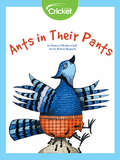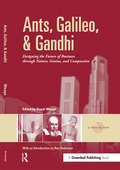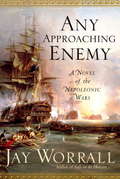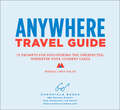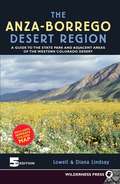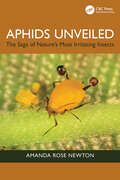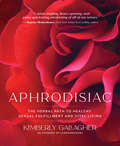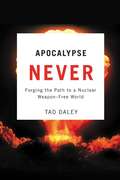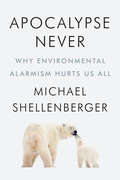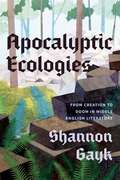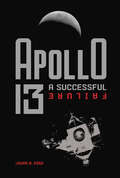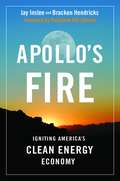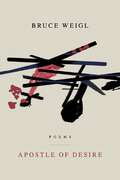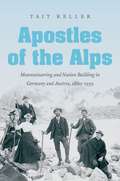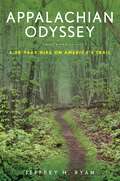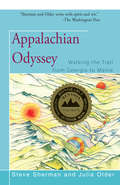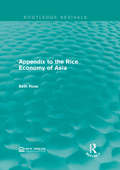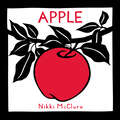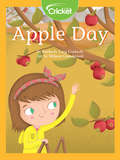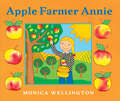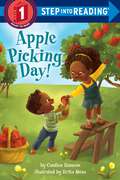- Table View
- List View
Ants in Their Pants
by Patricia Nikolina ClarkIf you accidentally sat on an anthill, and little black ants started to crawl all over you, would you stay there? Of course not!
Ants, Galileo, and Gandhi: Designing the Future of Business through Nature, Genius, and Compassion
by Sissel WaageAlthough sustainability efforts in business are still a work in progress, it is increasingly clear that key elements of a new generation of enterprises will be radically different from those of our contemporary modern industrial economy. The core distinctions between what currently exists and what is being created are communicated in this book through the compelling metaphor of Ants, Galileo, and Gandhi.This collection, developed from The Natural Step's conference on Sustainability and Innovation in 2002, provides radical ideas for generating a new perspective on the dynamics of business systems. "Ants" symbolise the lessons to be learned from nature and the dependence of individual beings on broader, complex systems. "Galileo" embodies brilliance in perceiving and proving that the current paradigm is flawed. 'Gandhi' exemplifies exceptional compassion in fighting for fundamental change.All of these attributes are increasingly relevant in a world where, globally, we are experiencing both a steady decline in life-supporting resources and rising demands. Recognition of these challenges is sparking innovation within the private sector where the first glimmers of systemic change can be seen. The book examines the emergence of 21st-century enterprises that recognise their reliance on broad social and ecological systems ("ants"), incorporate sparks of genius rooted in rigorous analyses ("Galileo"), and acknowledge the importance of compassion and determination within any endeavour ("Gandhi").With contributions from Ray Anderson, Gretchen Daily, Karl-Henrik Rob
Anxious Politics
by Bethany Albertson Gadarian Shana KushnerEmotions matter in politics - enthusiastic supporters return politicians to office, angry citizens march in the streets, a fearful public demands protection from the government. Anxious Politics explores the emotional life of politics, with particular emphasis on how political anxieties affect public life. When the world is scary, when politics is passionate, when the citizenry is anxious, does this politics resemble politics under more serene conditions? If politicians use threatening appeals to persuade citizens, how does the public respond? Anxious Politics argues that political anxiety triggers engagement in politics in ways that are potentially both promising and damaging for democracy. Using four substantive policy areas (public health, immigration, terrorism, and climate change), the book seeks to demonstrate that anxiety affects how we consume political news, who we trust, and what politics we support. Anxiety about politics triggers coping strategies in the political world, where these strategies are often shaped by partisan agendas.
Any Approaching Enemy: A Novel of the Napoleonic Wars
by Jay WorrallWith the stunning high-seas adventure Sails on the Horizon, Jay Worrall introduced a bold new hero in the rousing tradition of Jack Aubrey: Charles Edgemont, an ambitious officer in His Britannic Majesty's navy. Raised to the rank of captain for gallantry under fire, Edgemont proved his mettle in the bruising British victory over the Spanish fleet at the Battle of St. Vincent. Now married and in command of the twenty-eight-gun frigate Louisa, the young captain sails toward a day of destiny-for himself and for England. The year is 1798. The war between England and revolutionary France has reached a bloody stalemate, with England in the ascendancy at sea and France unchallenged on the Continent, thanks in large part to an unorthodox twenty-eight-year-old general named Napoleon Bonaparte. But the French, secretly amassing a powerful fleet, mean to break the impasse. When rumors of the French preparations leak, the Admiralty dispatches a squadron of seven ships-among them the Louisa-under the command of Rear Admiral Horatio Nelson to investigate. Blindsided by a storm of ferocious intensity, the ships scatter across the seas. After the storm subsides, the damaged frigates limp back to the rendezvous point. But there is no sign of Nelson's flagship, Vanguard, nor of two other ships of the line. Edgemont fears that the pugnacious rear admiral has pressed on with the mission. Putting his career on the line by disobeying direct orders, Edgemont sets out in pursuit of Nelson and the French fleet on a treacherous voyage along the Tuscan coast. As tensions among the crew threaten to explode into open insubordination or worse, Edgemont makes an unexpected discovery in Naples that may seriously compromise his mission. When the missing French fleet turns up off the shores of Egypt, conveying an army tens of thousands strong, Edgemont is suddenly thrown into a crisis of conscience. As circumstances grow dire and require heroic action, the fate of the crucial battle effectively lies in Edgemont's hands-as does the course of history. From the Hardcover edition.
Anywhere Artist
by Nikki Slade Robinson"I don't need paint or paper. I can make art anywhere. My imagination is all I need."In spare, delightful text and illustrations, an exuberant artist makes art from found objects and the world around her. This sprightly picture book celebrates creativity and will inspire readers to find art all around them, unleash their imaginations, and make their own artistic creations.
Anywhere Travel Guide: 75 Prompts for Discovering the Unexpected, Wherever Your Journey Leads
by Magda Lipka FalckSeventy-five ways to embrace a spirit of adventure—around the world or around the corner.Ask the next person you meet where his/her favorite street is. Go there.Write down what you like about this city on a small piece of paper. Leave it where someone else will find it later.If you can see a shop from where you are, step inside it.A creative travel guide for anywhere, this handy book includes seventy-five inspirations for exploration. With a unique mix of concrete actions and whimsical prompts, the Anywhere Travel Guide takes you on a journey that encourages you to see things differently, to discover both new and familiar places—and to bring a new spirit of adventure to your life.
Anza-Borrego Desert Region
by Lowell Lindsay Diana LindsayNow in its expanded 5th edition, The Anza-Borrego Desert Region offers complete coverage of the over 1 million acres of desert lands, including Anza-Borrego State Park, Ocotillo Wells State Vehicular Recreation Area (OWSVRA), parts of the Santa Rosa and San Jacinto Mountains National Monument, and adjacent BLM recreational and wilderness lands.
Aphids Unveiled: The Saga of Nature's Most Irritating Insects
by Amanda Rose NewtonAphids Unveiled: The Saga of Nature's Most Irritating Insects explores the curious journey of these tiny insects from humble beginnings to becoming the most obnoxious pests for farmers and home gardeners alike. With a witty narrative style and a touch of humor, the book aims to engage readers with the quirky behaviors, social structures, and survival strategies of aphids, all while unraveling the reasons behind their impact on agriculture and horticulture.Amanda Rose Newton brings over a decade of experience in both the horticulture and pest control worlds to write for a broad audience, from gardening enthusiasts seeking effective pest management strategies to science enthusiasts interested in a lighthearted exploration of the natural world. As an entomologist and professor, her writing uniquely blends expertise with a passion for storytelling, ensuring Aphids Unveiled is not only informative but also an entertaining read.
Aphrodisiac: The Herbal Path to Healthy Sexual Fulfillment and Vital Living
by Kimberly GallagherFrom the co-founder of one of the world's most respected herbal education websites: recipes, rituals, practices, and personal stories to help you live a more sexually fulfilled and vital life.Plants are the great healers of the earth, and their capacity to support healthy sexuality is just as powerful. This beautifully written and illustrated book brings you into a relationship with herbs for sexual fulfillment and empowerment.Drawing on her own knowledge of herbalism and sacred sensuality, along with intimate stories from students who implemented her teachings, Kimberly Gallagher guides you on a personal journey of growth aided by the aphrodisiac properties and sensual uses of healing herbs and flowers such as damiana, cacao, and rose. Kimberly is an author and co-founder of LearningHerbs, a widely respected herbal education website.In Aphrodisiac, you'll find thoughtful, soulful rituals and dozens of recipes for putting the herbs to use, such as Autumn Blush Cordial, Rose Massage Oil, and Cardamom Chocolate Mousse Torte. You'll read user-friendly and well-researched monographs that teach you everything you need to know about every featured herb. And you'll find a wide range of practices for inviting erotic energy flow into your life--including creating an inviting environment, nourishing your body, and simply slowing down so there's time to savor pleasure. When people are sensually alive and sexually fulfilled, they are more confident, creative, and joyful. They are also more likely to share their unique personal gifts with the world.Aphrodisiac is an essential resource for anyone wishing to live a more vibrant life.
Apocalypse Never: Forging the Path to a Nuclear Weapon-Free World
by Tad DaleyApocalypse Never maintains that the abolition of nuclear weapons is both essential and achievable, and reveals in fine detail what we need to do--both governments and movements--to make it a reality. Tad Daley insists that while global climate change poses the single greatest long-term peril to the human race, the nuclear challenge in its many incarnations--nuclear terror, nuclear accident, a nuclear crisis spinning out of control--poses the single most immediate peril. Daley has written a book for the general reader about this most crucial of contemporary challenges.
Apocalypse Never: Why Environmental Alarmism Hurts Us All
by Michael ShellenbergerClimate change is real but it’s not the end of the world. It is not even our most serious environmental problem. Michael Shellenberger has been fighting for a greener planet for decades. He helped save the world’s last unprotected redwoods. He co-created the predecessor to today’s Green New Deal. And he led a successful effort by climate scientists and activists to keep nuclear plants operating, preventing a spike of emissions.But in 2019, as some claimed “billions of people are going to die,” contributing to rising anxiety, including among adolescents, Shellenberger decided that, as a lifelong environmental activist, leading energy expert, and father of a teenage daughter, he needed to speak out to separate science from fiction.Despite decades of news media attention, many remain ignorant of basic facts. Carbon emissions peaked and have been declining in most developed nations for over a decade. Deaths from extreme weather, even in poor nations, declined 80 percent over the last four decades. And the risk of Earth warming to very high temperatures is increasingly unlikely thanks to slowing population growth and abundant natural gas. Curiously, the people who are the most alarmist about the problems also tend to oppose the obvious solutions. What’s really behind the rise of apocalyptic environmentalism? There are powerful financial interests. There are desires for status and power. But most of all there is a desire among supposedly secular people for transcendence. This spiritual impulse can be natural and healthy. But in preaching fear without love, and guilt without redemption, the new religion is failing to satisfy our deepest psychological and existential needs.
Apocalyptic Ecologies: From Creation to Doom in Middle English Literature
by Shannon GaykA meditative reflection on what medieval disaster writing can teach us about how to respond to the climate emergency. When a series of ecological disasters swept medieval England, writers turned to religious storytelling for precedents. Their depictions of biblical floods, fires, storms, droughts, and plagues reveal an unsettled relationship to the natural world, at once unchanging and bafflingly unpredictable. In Apocalyptic Ecologies, Shannon Gayk traces representations of environmental calamities through medieval plays, sermons, and poetry such as Cleanness and Piers Plowman. In premodern disaster writing, she recovers a vision of environmental flourishing that could inspire new forms of ecological care today: a truly apocalyptic sensibility capable of seeing in every ending, every emergency a new beginning waiting to emerge.
Apollo 13: A Successful Failure
by Laura B. Edge"Houston, we've had a problem." On April 13, 1970, the three astronauts aboard the Apollo 13 spacecraft were headed to the moon when a sudden explosion rocked the ship. Oxygen levels began depleting rapidly. Electrical power began to fail. Astronauts James Lovell, Jack Swigert, and Fred Haise were about to be stranded in the inky void of outer space. The mission to the moon was scrapped. Now, Apollo 13's only goal was to bring the crew home. With the damaged spacecraft hurtling towards the moon at roughly six thousand miles per hour, there was little hope of success. But the astronauts and mission control were fully prepared to do whatever it took to return the crew to Earth. This space disaster occurred at the peak of the United States' Space Race against the Soviet Union. But for four days in 1970, the two nations put aside their differences, and the entire world watched the skies, hoping and praying the astronauts would return safely. As missions to Mars and commercial space flight become a reality, the time is now to be reminded of our common humanity, of how rivals can work together and support each other towards a shared goal. Because no matter what happens or where we travel, we all call Earth home.
Apollo in the Age of Aquarius
by Neil M. MaherIn summer 1969, astronauts landed on the moon and hippie hordes descended on Woodstock—two era-defining events that are not entirely coincidental. Neil M. Maher shows how NASA’s celestial aspirations were tethered to terrestrial concerns of the time: the civil rights struggle, the antiwar movement, environmentalism, feminism, and the culture wars.
Apollo's Fire: Igniting America's Clean Energy Economy
by Bracken Hendricks Jay InsleeIn 1961, President John F. Kennedy ignited America's Apollo Project and sparked a revolution in space exploration. Today the New Apollo Energy Project is poised to revolutionize the production of energy and thereby save our planet. The nation that built the world's most powerful rockets, its most advanced computers, and its most sophisticated life support systems is ready to create the world's most powerful solar energy systems, its most advanced wind energy turbines, and its most sophisticated hybrid cars. This will result in nothing less than a second American Revolution. Who are the dreamers in California who believe they can use mirrors and liquid metal to wring more electricity from a ray of sunshine than anyone else on earth can? Who are the innovators who have built a contraption that can turn the energy of a simple wave off the Oregon coast into burnt toast in Idaho? Who are the scientists in Massachusetts who have invented a battery that now runs your hand drill and will soon run your car? Readers will meet them all in this book. They will learn how the new energy economy will grow, the research that is required, and the legislation that must be passed to make the vision a reality. This is a thoughtful, optimistic book, based on sound facts. No one before has tied together the concepts of economic growth and greenhouse gas reductions with such concrete examples. No one has previously told the real stories of the people who are right now on the front lines of the energy revolution. The co-authors, one a U.S. Congressman who is the primary sponsor of the New Apollo Energy Act, and the other the founder of the Apollo Alliance, have joined their experience, expertise, and passion for a clean energy future to lay out the path to stop global warming and gain energy independence.
Apostle of Desire
by Bruce WeiglTwo-time Pulitzer Prize finalist and one of America’s most revered military veteran writers —Bruce Weigl brings readers face-to-face with our country’s legacy of violence, the suffering of combat PTSD, and what it means to be truly haunted.Taking its cue from James Wright’s goal to write “the poetry of a grown man,” the poems in Apostle of Desire juxtapose the peace and comfort offered by the natural world with the bruising intensity of manmade violence. These sudden tonal shifts express a vulnerability and extremity of feeling that strips audiences’ own emotions bare, leading readers to question their roles as bystanders and consumers of violent media.In sharing his intertwining feelings of love and shame for both country and self, Weigl places readers into the role of the watcher and opens a window into the traumas of the Vietnam War and life’s daily battles with PTSD. The honesty of Weigl’s poetry exposes the ghosts of pain while still witnessing the glories of love, nature, and his ongoing experiences with the rich daily life of contemporary Vietnam.Readers will face the solitude of regret and the hopeful pursuit of redemption—remembering the past and looking toward the future.
Apostles of the Alps
by Tait KellerThough the Alps may appear to be a peaceful place, the famed mountains once provided the backdrop for a political, environmental, and cultural battle as Germany and Austria struggled to modernize. Tait Keller examines the mountains' threefold role in transforming the two countries, as people sought respite in the mountains, transformed and shaped them according to their needs, and over time began to view them as national symbols and icons of individualism. In the mid-nineteenth century, the Alps were regarded as a place of solace from industrial development and the stresses of urban life. Soon, however, mountaineers, or the so-called apostles of the Alps, began carving the crags to suit their whims, altering the natural landscape with trails and lodges, and seeking to modernize and nationalize the high frontier. Disagreements over the meaning of modernization opened the mountains to competing agendas and hostile ambitions. Keller examines the ways in which these opposing approaches corresponded to the political battles, social conflicts, culture wars, and environmental crusades that shaped modern Germany and Austria, placing the Alpine borderlands at the heart of the German question of nationhood.
Appalachia: The Voices of Sleeping Birds
by Cynthia RylantFrom the book: IN A CERTAIN PART of the country called Appalachia you will find dogs named Prince or King living in little towns with names like Coal City and Sally's Backbone. These dogs run free, being country dogs, and their legs are full of muscles from running rabbits up mountains or from following boys who push old bikes against the hill roads they call hollows. These are mostly good dogs and can be trusted. The owners of these dogs who live in Appalachia have names like Mamie and Boyd and Oley, and they probably have lived in Appalachia all of their lives. Many of them were born in coal camps in tiny houses which stood on poles and on the sides of which you could draw a face with your finger because coal dust had settled on their walls like snow.
Appalachian Odyssey: A 28-Year Hike on America's Trail
by Jeffrey H RyanLike many hikers who&’ve completed the Appalachian Trail, Jeffrey Ryan didn&’t do it in one long through-hike. Grabbing weekends here and days off there, it took Jeffrey twenty-eight years to finish the trail, and along the way he learned much about himself and made many new friends, including his best friend, who made the journey with him from start to finish. Including 75 color photos, this engaging book is part memoir, part natural history and lore, and part practical advice. Whether you&’ve hiked the AT, are planning to hike it, or only wish to dream of hiking it, this is the book to read next.
Appalachian Odyssey: Walking the Trail from Georgia to Maine
by Julia Older Steve ShermanTrail along on this 2,000-mile, bliss-and-blister adventure away from interstates and into backwoods America. Cross the Smokies, survive Virginia floods, buck New Jersey heat, walk the Presidentials of the White Mountains, and traverse a mile-long gorge. Then, 150 days later, stand victorious on the summit of Mount Katahdin in Maine. Appalachian Odyssey has everything--and then some--about the great hike. Inspiring for all ages whether you're a backpacker or an armchair hiker. Appalachian Odyssey was awarded the Honorable Mention in the Outdoor Classic category by the 2009 National Outdoor Book Awards (NOBA). The Outdoor Classic Award is presented annually to an "unusual and lasting" book that over time has proven to be a significant work in the field.
Appendix to the Rice Economy of Asia (Routledge Revivals)
by Beth RoseOriginally published in 1985, Beth Rose’s Appendix to the Rice Economy of Asia provides twenty-six tables detailing various rice statistics across Asia from the beginning of the twentieth century through to the 1980’s. Statistics presented include; total crop area, rice production and yield, import and export, rice prices, farm wages and populations of countries or areas within Asia. This title will be of interest to students of Environmental Studies and Economics.
Apple
by Nikki McClureApple follows the life of an apple throughout the year, demonstrating the cyclical patterns in nature. The youngest readers will delight in following the journey of the bright red apple—the only splash of color in the otherwise black-and-white illustrations—as it travels from tree, to harvest, to snack, to compost, and finally to sprout. A single word complements each illustration, urging early readers to reflect on each stage in the apple’s life. Apple is acclaimed cut-paper artist Nikki McClure’s very first book, originally self-published and sold in a limited edition of just 200 copies. Now, 16 years later, it is available in wide release, and fans will relish the chance to own the book that launched McClure’s signature style.
Apple Day
by Kimberly Long CockroftLong ago, when the mountains looked down on a bare, quiet valley, Molly's grandparents planted tiny saplings in a newly cleared field. Now Molly and her cousin Sam pick apples from the orchard to make blue-ribbon applesauce! Recipe Included.
Apple Farmer Annie Board Book
by Monica WellingtonA new format for a yummy fall favorite Filled with bright primary colors and pictures of America's favorite fruit, Wellington's enticing story follows Annie, a busy apple farmer. She picks, counts, sorts, bakes tasty treats, and sells her best apples. Already successful in hardcover and paperback, Apple Farmer Annie in board book format is one that young tots will find absolutely irresistible.
Apple Picking Day! (Step into Reading)
by Candice RansomWho doesn&’t love to go apple picking at the first sign of fall? A sister and brother celebrate autumn with a trip to a local apple orchard in this simple, rhyming Step 1 early reader. The kids bound with glee through the rows of trees, and race against other children to pick the most and the best apples. The story of their day is bright, fun, and full of light action. It&’s told in easy-to-follow rhyme, ensuring a successful reading experience. Step 1 Readers feature big type and easy words. Rhymes and rhythmic text paired with picture clues help children decode the story. These books are for children who know the alphabet and are eager to begin reading.
